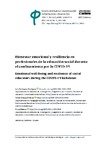Bienestar emocional y resiliencia en profesionales de la educación social durante el confinamiento por la COVID-19

Use este enlace para citar
http://hdl.handle.net/2183/29119
A non ser que se indique outra cousa, a licenza do ítem descríbese como Atribución-Compartir igual 4.0 Internacional (CC BY-SA 4.0)
Coleccións
Metadatos
Mostrar o rexistro completo do ítemTítulo
Bienestar emocional y resiliencia en profesionales de la educación social durante el confinamiento por la COVID-19Título(s) alternativo(s)
Emotional Well-Being and Resilience of Social Educators During the COVID-19 LockdownData
2021-12-01Cita bibliográfica
Rodríguez-Rodríguez, J., Ortega-Ortigoza, D., & Mateos, A. (2021). Bienestar emocional y resiliencia en profesionales de la educación social durante el confinamiento por la COVID-19. Revista de Estudios e Investigación en Psicología y Educación, 8(2), 242-260. https://doi.org/10.17979/reipe.2021.8.2.8692
Resumo
[Resumen] La pandemia de COVID-19 y las medidas de confinamiento resultantes han impactado en la salud física y mental de la población de diferentes maneras. Como profesionales esenciales, los educadores sociales que trabajan en centros de atención residencial para niños y jóvenes han tenido que hacer frente a presiones adicionales como las medidas de confinamiento domiciliario y tener que continuar su trabajo en circunstancias excepcionales. Para evaluar el impacto de las medidas de cierre en el bienestar emocional y la resiliencia de los educadores sociales, se realizó un estudio exploratorio ex post facto basado en una muestra de 72 educadores sociales (30,6% hombres y 69,4% mujeres) que trabajan en centros residenciales de protección de la infancia en Cataluña. La encuesta recogió datos sobre el bienestar emocional (PANAS y SWLS) y la resiliencia (RS-14), y también los datos sociodemográficos de los participantes. Los resultados muestran valores similares en relación con el bienestar emocional y la resiliencia, sin diferencias significativas entre las categorías sociodemográficas. Se encontró una correlación positiva entre el equilibrio afectivo, la satisfacción vital y la resiliencia. Las conclusiones del estudio ponen de manifiesto la necesidad de apoyar el bienestar emocional de los educadores sociales promoviendo su capacidad de resiliencia, teniendo en cuenta la ya de por sí compleja tarea de atención socioeducativa a la infancia y adolescencia en acogimiento residencial, y la dificultad adicional del confinamiento. [Abstract] The COVID-19 pandemic and resulting lockdown measures have impacted on the physical and mental health of the population in different ways. As essential professionals, social educators working in residential care centres for children and young people have had to deal with additional pressures such as lockdown measures and having to continue their work under exceptional circumstances. To assess the impact of lockdown measures on social educators’ emotional well-being and resilience, an ex post facto exploratory study was conducted based on a sample of 72 social educators (30.6% men and 69.4% women) working in residential childhood protection centres in Catalonia. The survey collected data on emotional well-being (PANAS and SWLS) and resilience (RS-14), and also the participants’ sociodemographic details. The results show similar values in relation to emotional well-being and resilience, with no significant differences between sociodemographic categories. A positive correlation was found between affective balance, life satisfaction and resilience. The conclusions of the study highlight the need to support the emotional well-being of social educators by promoting their capacity for resilience, taking into account the already complex task of the socio-educational care of children and adolescents in residential care, and the additional difficulty of lockdown. [Abstract] The COVID-19 pandemic and resulting lockdown measures have impacted on the physical and mental health of the population in different ways. As essential professionals, social educators working in residential care centres for children and young people have had to deal with additional pressures such as lockdown measures and having to continue their work under exceptional circumstances. To assess the impact of lockdown measures on social educators’ emotional well-being and resilience, an ex post facto exploratory study was conducted based on a sample of 72 social educators (30.6% men and 69.4% women) working in residential childhood protection centres in Catalonia. The survey collected data on emotional well-being (PANAS and SWLS) and resilience (RS-14), and also the participants’ sociodemographic details. The results show similar values in relation to emotional well-being and resilience, with no significant differences between sociodemographic categories. A positive correlation was found between affective balance, life satisfaction and resilience. The conclusions of the study highlight the need to support the emotional well-being of social educators by promoting their capacity for resilience, taking into account the already complex task of the socio-educational care of children and adolescents in residential care, and the additional difficulty of lockdown.
Palabras chave
Afectividad
Satisfacción con la vida
Afrontamiento
Pandemia
Acogimiento residencial
Affectivity
Life satisfaction
Coping
Pandemic
Foster care
Pandemic
Coping
Life satisfaction
Affectivity
Satisfacción con la vida
Afrontamiento
Pandemia
Acogimiento residencial
Affectivity
Life satisfaction
Coping
Pandemic
Foster care
Pandemic
Coping
Life satisfaction
Affectivity
Versión do editor
Dereitos
Atribución-Compartir igual 4.0 Internacional (CC BY-SA 4.0)
ISSN
2386-7418






